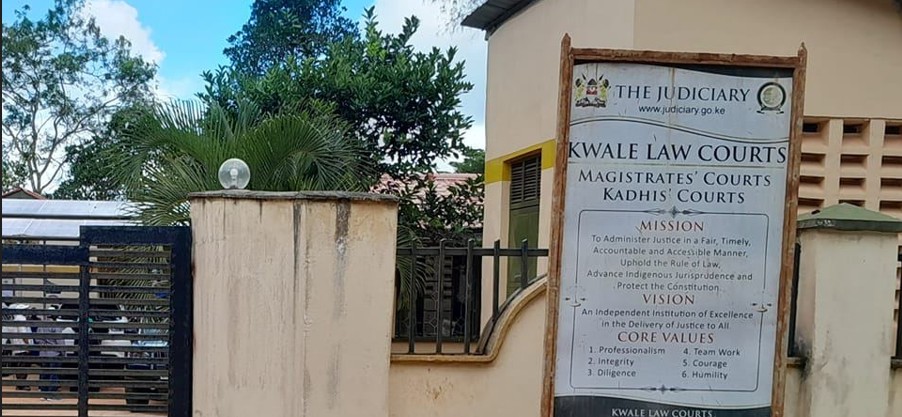Kenya moves to block weapons threat with new strategic goods control Bill

The legislation will also likely boost investor confidence by ensuring that Kenya is a safe and responsible place to do business, particularly for those involved in sensitive industries.
In a bid to enhance national security and prevent the misuse of sensitive materials, Kenya has introduced the Strategic Goods Control Bill, 2025.
The legislation aims to regulate the import, export and transit of goods and technologies that could potentially be diverted for the production of weapons of mass destruction.
More To Read
- Interior Ministry says cyberattack on state websites contained as experts cite extremist motive
- KPSEA, KJSEA exams proceeding smoothly nationwide - PS Raymond Omollo
- Haiti is under a UN arms embargo: So why are 500,000 illegal weapons in circulation?
- Public viewing for Raila Odinga at Mamboleo extended
- US boosts Kenya's fight against weapons of mass destruction with specialised four-month training
- Interior PS Raymond Omollo summoned over Sh6.5 billion IDP compensation delay
The Bill is designed to address the growing concerns over dual-use materials, those that can be used for both civilian and military purposes, such as certain chemicals, biological agents, and software.
One of the key components of the Bill is the introduction of a licensing system that would regulate those involved in the handling of these sensitive goods, including brokers and intermediaries who operate in both physical and digital spaces.
The proposed law also outlines stringent enforcement mechanisms, with severe penalties for any violations.
Interior Principal Secretary Raymond Omollo, who represented Cabinet Secretary Kipchumba Murkomen at a high-level forum in Naivasha, said that the Bill is the product of over 10 years of national and international collaboration aimed at addressing the security risks posed by chemical, biological, radiological and nuclear materials.
The forum, attended by senators, government officials and representatives from the US Embassy, provided an opportunity to highlight the Bill’s key provisions.
“This Bill is the culmination of extensive efforts to mitigate risks associated with dangerous materials,” Omollo said, emphasising that the legislation will help secure Kenya’s position in line with global treaties such as the Chemical Weapons Convention, the Biological Weapons Convention and the United Nations Security Council Resolution 1540.
Digital platforms
The Bill also addresses the increasing role of digital platforms in global security concerns.
As technology advances, the movement of digital goods such as software and technical data has become a potential avenue for the illicit spread of sensitive materials.
By regulating these transmissions, the Bill seeks to protect Kenya’s digital infrastructure from being exploited for illegal purposes, ensuring that the country’s cyber space is not used for the development of weapons of mass destruction.
“The Bill will ensure that Kenya’s borders and digital spaces are not used for activities that could harm our nation, the region, or the world,” Omollo stressed, reflecting on past tragedies such as the 1998 bombing of the US Embassy in Nairobi and the 2012 explosion on Moi Avenue, both of which serve as painful reminders of the risks posed by unregulated access to dangerous materials.
Kenya Nuclear Regulatory Authority Director-General James Keter also highlighted the Bill’s role in strengthening oversight across all stages of strategic goods.
From manufacturing and storage to export and trans-shipment, the new proposed law will give Kenya the legal framework necessary to manage and track these materials, ensuring full compliance with international standards.
“The Bill will provide the regulatory framework we need to monitor strategic goods throughout their lifecycle and ensure they are not diverted for illicit purposes,” Keter said.
The Bill’s focus on enforcement is aimed at deterring illegal activities by imposing strict penalties for violations, such as heavy fines and imprisonment. This would address growing concerns about the use of dual-use goods in terrorism and warfare.
Omollo said Kenya’s strategic position as a regional trade and transit hub places additional responsibility on the country to ensure its infrastructure, both physical and digitalis protected from being misused for malicious purposes.
By introducing these tighter regulations, Kenya is taking proactive measures to safeguard its borders and digital spaces, thereby reducing the risk of its materials being exploited for harmful activities.
Once the law is enacted, it is expected to improve the country's international standing in terms of security and trade.
The legislation will also likely boost investor confidence by ensuring that Kenya is a safe and responsible place to do business, particularly for those involved in sensitive industries.
“The passage of this Bill will not only enhance our national security but also position Kenya as a leader in strategic trade control on the African continent,” Omollo said.
Top Stories Today












































